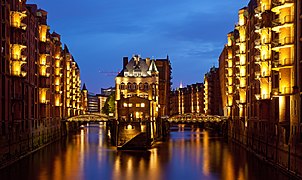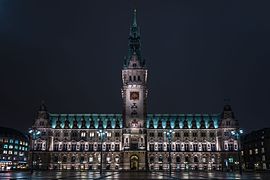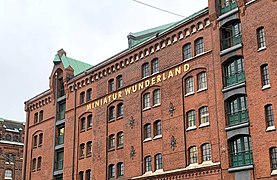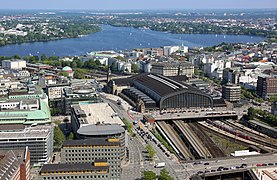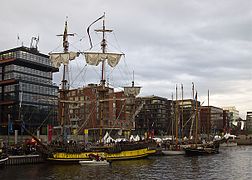
Hamburg
Hamburg (German: [ˈhambʊʁk] ⓘ,[7] locally also [ˈhambʊɪ̯ç] ⓘ; Low Saxon: Hamborg [ˈhambɔːç] ⓘ), officially the Free and Hanseatic City of Hamburg,[8][9] is the second-largest city in Germany, after Berlin, and 8th-largest in the European Union, with a population of over 1.9 million.[10][1] The Hamburg Metropolitan Region has a population of over 5.1 million and is the ninth-biggest metropolitan region by GDP in the European Union.
This article is about the city in Germany. For other uses, see Hamburg (disambiguation).
Hamburg
Hamborg (Low German)
Germany
3 (of 69)
755.22 km2 (291.59 sq mi)
1,945,532
2,600/km2 (6,700/sq mi)
2,484,800[1]
5,425,628
€144.220 billion (2022)
€76,910 (2022)
040
DE-HH
- HH (1906–1945; again since 1956)
- MGH (1945)
- H (1945–1947)
- HG (1947)
- BH (1948–1956)
DE6
At the southern tip of the Jutland Peninsula, Hamburg stands on the branching River Elbe at the head of a 110 km (68 mi) estuary to the North Sea, on the mouth of the Alster and Bille. Hamburg is one of Germany's three city-states alongside Berlin and Bremen, and is surrounded by Schleswig-Holstein to the north and Lower Saxony to the south. The Port of Hamburg is Germany's largest and Europe's third-largest, after Rotterdam and Antwerp. The local dialect is a variant of Low Saxon.
The official name reflects Hamburg's history as a member of the medieval Hanseatic League and a free imperial city of the Holy Roman Empire. Before the 1871 unification of Germany, it was a fully sovereign city state, and before 1919 formed a civic republic headed constitutionally by a class of hereditary Grand Burghers or Hanseaten. Beset by disasters such as the Great Fire of Hamburg, North Sea flood of 1962 and military conflicts including World War II bombing raids, the city has managed to recover and emerge wealthier after each catastrophe.
Major regional broadcaster NDR, the printing and publishing firm Gruner + Jahr and the newspapers Der Spiegel and Die Zeit are based in the city. Hamburg is the seat of Germany's oldest stock exchange and the world's oldest merchant bank, Berenberg Bank. Media, commercial, logistical, and industrial firms with significant locations in the city include multinationals Airbus, Blohm + Voss, Aurubis, Beiersdorf, Lufthansa and Unilever. Hamburg is also a major European science, research, and education hub, with several universities and institutions, including the Deutsches Elektronen-Synchrotron Laboratory DESY. The city enjoys a very high quality of living, being ranked 19th in the 2019 Mercer Quality of Living Survey.[11]
Hamburg hosts specialists in world economics and international law, including consular and diplomatic missions as the International Tribunal for the Law of the Sea, the EU-LAC Foundation, and the UNESCO Institute for Lifelong Learning, multipartite international political conferences and summits such as Europe and China and the G20. Former German chancellors Helmut Schmidt and Angela Merkel were both born in Hamburg. The former Mayor of Hamburg, Olaf Scholz, has been the current German chancellor since December 2021.
Hamburg is a major international and domestic tourist destination. The Speicherstadt and Kontorhausviertel were declared World Heritage Sites by UNESCO in 2015.[12] Hamburg's rivers and canals are crossed by around 2,500 bridges, making it the city with the highest number of bridges in Europe,[13] and with 5 of the world's 29 tallest churches standing in Hamburg, it is also the city with the highest number of churches surpassing 100 metres (330 ft) worldwide. Aside from its rich architectural heritage, the city is also home to notable cultural venues such as the Elbphilharmonie and Laeiszhalle concert halls. It gave birth to movements like Hamburger Schule and paved the way for bands including the Beatles. Hamburg is also known for several theatres and a variety of musical shows. St. Pauli's Reeperbahn is among the best-known European entertainment districts.
Infrastructure[edit]
Health systems[edit]
Hamburg has 54 hospitals. The University Medical Centre Hamburg-Eppendorf, with about 1,736 beds, houses a large medical school. There are also smaller private hospitals. On 1 January 2011 there were about 12,507 hospital beds.[146] The city had 5,663 physicians in private practice and 456 pharmacies in 2010.[147]



